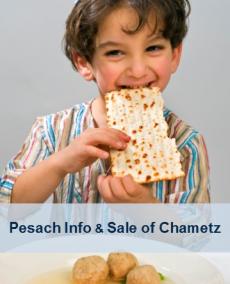The rows of sugar, tea and horseradish sauce with their Beth Din labels must seem far removed from the Biblical verse “You shall eat no leaven” (Ex. XIII). Many products are regarded as strictly kosher throughout the year without any kind of Hechsher, yet for Pesach, the careful kosher consumer will buy nothing unless it bears the proclamation: “With the sanction of the Beth Din”.
Whence this sudden desire for “sanction”, and why is it necessary?
The stringency of chametz prohibition is unique among the laws of Kashrut. No fewer than eight separate biblical commandments regulate chametz and matzah. There are three prohibitions against eating chametz, two commandments prohibit the possession of chametz, and there is a specific mitzvah of Tashbisu – disposal of chametz before Pesach begins.
Another reason for taking extra care is that the sight of a biscuit eaten every day, 357 days per year, is unlikely to invoke the same horror as a pork sausage or a hamburger with cheese! The possibility of consumption in error is therefore distinctly greater.
Chametz, literally “leaven”, refers to far more than just bread and cake. The Mishnah (Pesachim 25) defines five types of grain – wheat, barley, oats, rye and spelt – which become chametz if they remain in contact with water for more than 18 minutes before baking. In practice, all ordinary flour is dampened and left to “condition” for 12 hours or more to soften the grain for milling. In fact, it is not unknown for farmers deliberately to wet grain so as to raise the moisture content and thus the weight, in order to command a higher price.
For this reason, matzah flour is carefully supervised throughout the entire milling process.
The list of grain-derived ingredients increases continually due to sophisticated food manufacturing techniques. Starch, fermentation alcohol, vinegar, glucose, dextrose, caramel, sorbitol, ascorbic acid and other vitamins, citric acid, yeast and many flavour sub-ingredients are frequently derived from chametz.
It is clearly impossible for consumers to be confident of avoiding chametz unless all ingredients and production lines have been professionally investigated.
An innocent looking lemonade often contains chametz in the form of glucose syrup used as a sweetener. In Europe glucose is mainly produced from wheat fermentation, creating a serious chametz problem as so many sub ingredients are produced from glucose. Citric acid, for example, used in fizzy drinks, jams, ice creams and elsewhere, is often made from glucose. For a supervised Pesach production only a citric acid made from molasses and approved for Passover may be used.
Vitamin C /Ascorbic acid is another glucose-derived ingredient and many a ‘pure’ orange juice will declare ‘with added vitamin C’. Ascorbic acid is also used as an antioxidant in tinned vegetables and tinned fruit and may not necessarily be declared.
A major ingredient in all Cola drinks is caramel, also commonly made from glucose. Passover cola will use a specially manufactured caramel produced under supervision from Invert Sugar after thoroughly cleaning and kashering the factory.
The origin of special Passover supervision goes back to the beginnings of processed food manufacture. Shuchan Aruch quotes the Terumas Hadeshen (1390-1460) requiring the supervision of Sugar for Passover, and Shaare Teshuva, an early commentary on the Shulchan Aruch, urges great caution with other processed products. He quotes Shevus Yaakov (1670-1733): “I have heard that many people avoid (unsupervised) tea due to the problem of swindlers who buy used tea, then dry and reprocess it…” I found this difficult to believe until many years ago, an eminent Dayan sent me a Brooke Bond Tea card, from a series on the history of tea, which read: “Until the 18th century, heavy taxes were imposed on tea in Britain and so smuggling developed into a profitable and sophisticated enterprise. Rogue dealers were also common, passing off used tea which had been treated and dried, or mixed with fillers such as dried liquorice leaves. It was not unknown for animal dung to be used.”
Although with modern quality control systems fraudulent adulteration of a product is unlikely, the Passover label remains vital. Without it, how many people would realise that instant tea may contain chametz in the form of dextrose and malt? Earl Grey tea with Bergamot oil may contain Maltodextrin and other special teas have flavours added.
However, with the Sanction of the Beth Din, Passover can be both happy and kosher.




